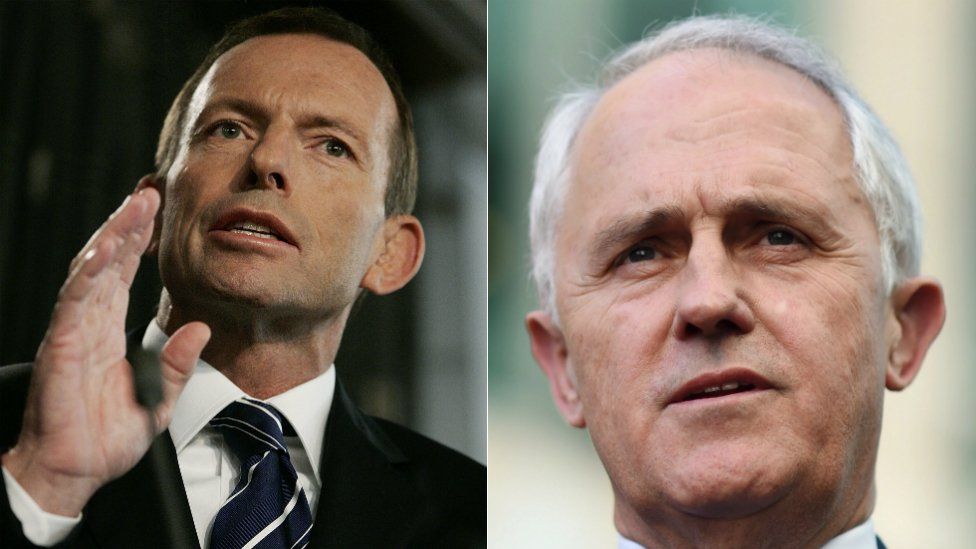Australia: Coup capital of the democratic world
- Published

With five prime ministers in as many years, Canberra has solidified its reputation as the coup capital of the democratic world.
A quarter century of Australian reform under Bob Hawke, Paul Keating and John Howard has been followed by an era of revenge.
Malcolm Turnbull, the new prime minister, was once knifed by the leader he deposed, Tony Abbott.
Kevin Rudd was ousted by Julia Gillard but then exacted vengeance by overthrowing her.
It is now over a decade since an Australian prime minister managed to serve out his or her first term.
Covering Australian politics feels more like conducting a triage of the wounded and slain. The bloodletting has become so brutal that party rooms have come to resemble abattoirs.
Were a movie to be made of Australian politics over the past decade it would have to be X-rated, and, as I have said before, be directed by Quentin Tarantino.
It could be modelled on those gory Ozploitation movies from the 1970s and 1980s that actually inspired the young Tarantino.
Australia even has its own unique language to describe the carnage:
- Leaders are "rolled."
- These leadership votes in caucus are called "spills."
- When a spill is in the offing the cry goes up: "It's on!"
From a ridiculously long list, I've been asked to pick out some of the most memorable coups. So here goes:
1983: Hawke ousts Hayden
Bob Hawke, the champion beer swiller and a politician who personified so many Aussie stereotypes, himself became leader of the Labor Party following a spill. His victim, on the second attempt, was Bill Hayden, who looked rather grey and listless alongside the plumed "Silver Bodgie."
On the very day that Mr Hawke became leader, Malcolm Fraser, the conservative prime minister, called a snap election, hoping to capitalise on Labor's feuding. But as Mr Hayden commented, ruefully, after his eviction: "A drover's dog could lead the Labor Party to victory, the way the country is."
Bob Hawke went on to win the election in a landslide.
1991: Keating ousts Hawke
Like Mr Hawke, Paul Keating needed two stabs to become Labor leader, and thus prime minister.
In a fractious relationship, similar in many ways to the long-running feud between Tony Blair and Gordon Brown, Mr Keating became increasingly exasperated by Hawke's refusal to indicate when he would step down and hand over power.
In June 1991, Mr Keating failed to oust Mr Hawke in a leadership challenge, and retreated to the backbenches claiming he had fired his "one shot."
But Mr Keating, a Cassius-like figure, wielded the knife in December that year, this time with brutal success.
2010: Gillard ousts Rudd
The rise and fall of Kevin Rudd provides one of the most extraordinary stories in Australian political history.
Mr Rudd won election in 2007 with Hawke-like approval ratings. Like John Howard, the prime minister he beat in the election, he looked like a politician who would one day have the word "era" attached to his name.
But he did not even survive a full first term. In 2010, following some policy missteps over an emissions trading system and proposed mining tax, he was ousted by his deputy Julia Gillard.
What made his removal all the more cruel was that under his stewardship - and partly because of his government's well-timed stimulus package - Australia managed to avoid recession after the 2008 global financial crisis.
Yet Mr Rudd was a control freak and intellectual bully with few close friends in government. When his poll numbers dropped - though they were far from being terminal - the party's powerful factional leaders moved against him.
One of the orchestrators of the coup was Labor's present leader Bill Shorten, his weapon a smart phone that he wielded with murderous effect from a restaurant table in Canberra.
2013 Rudd ousts Gillard
Julia Gillard never recovered from the manner in which she became leader.
Australia's first female prime minister broke through a glass ceiling but many voters regarded it as a smash and grab.
Though he became foreign affairs minister in her government, Mr Rudd started plotting his revenge almost immediately and was a hugely destabilising presence.
During a trip to Washington in February 2012, he dramatically resigned and announced he was challenging Ms Gillard for the leadership. On that occasion, she won comfortably, but it did not kill off her rival, or the speculation that swirled around her leadership.
Mr Rudd exacted his revenge in June 2013, when, in a desperate attempt to avoid being buried in an electoral landslide, the party room restored him to the prime ministership.
2015 Turnbull ousts Abbott
A republican, environmentalist and social moderate, Malcolm Turnbull has always been viewed with great suspicion by right-wingers in the Liberal Party.
A multi-millionaire, he hails from the richest enclave of Australia's richest constituency in the eastern suburbs of Sydney - but the party during the Howard years became more synonymous with blue-collar "battlers" in the city's western suburbs.
After becoming Liberal leader in September 2008 - he knocked off his predecessor Brendan Nelson - Mr Turnbull was always going to be vulnerable to a challenge. It came the following year, when Tony Abbott won by a solitary vote, 42-41.
Not long afterwards, Mr Turnbull announced his retirement from politics. But perhaps the crazed volatility of post-Howard Australian politics persuaded him to stay on.
Known for his naked and impatient ambition, Malcolm Turnbull this time bided his time.
Rather than move against Mr Abbott at the beginning of this year, when backbenchers tried to bring on a spill motion, Mr Turnbull waited until he had enough support on the right of the party.
His patience paid off. Given how long he has actively sought the prime ministership, his elevation feels almost preordained.
- Published14 September 2015
- Published14 September 2015
- Published14 September 2015
- Published14 September 2015
- Published14 September 2015